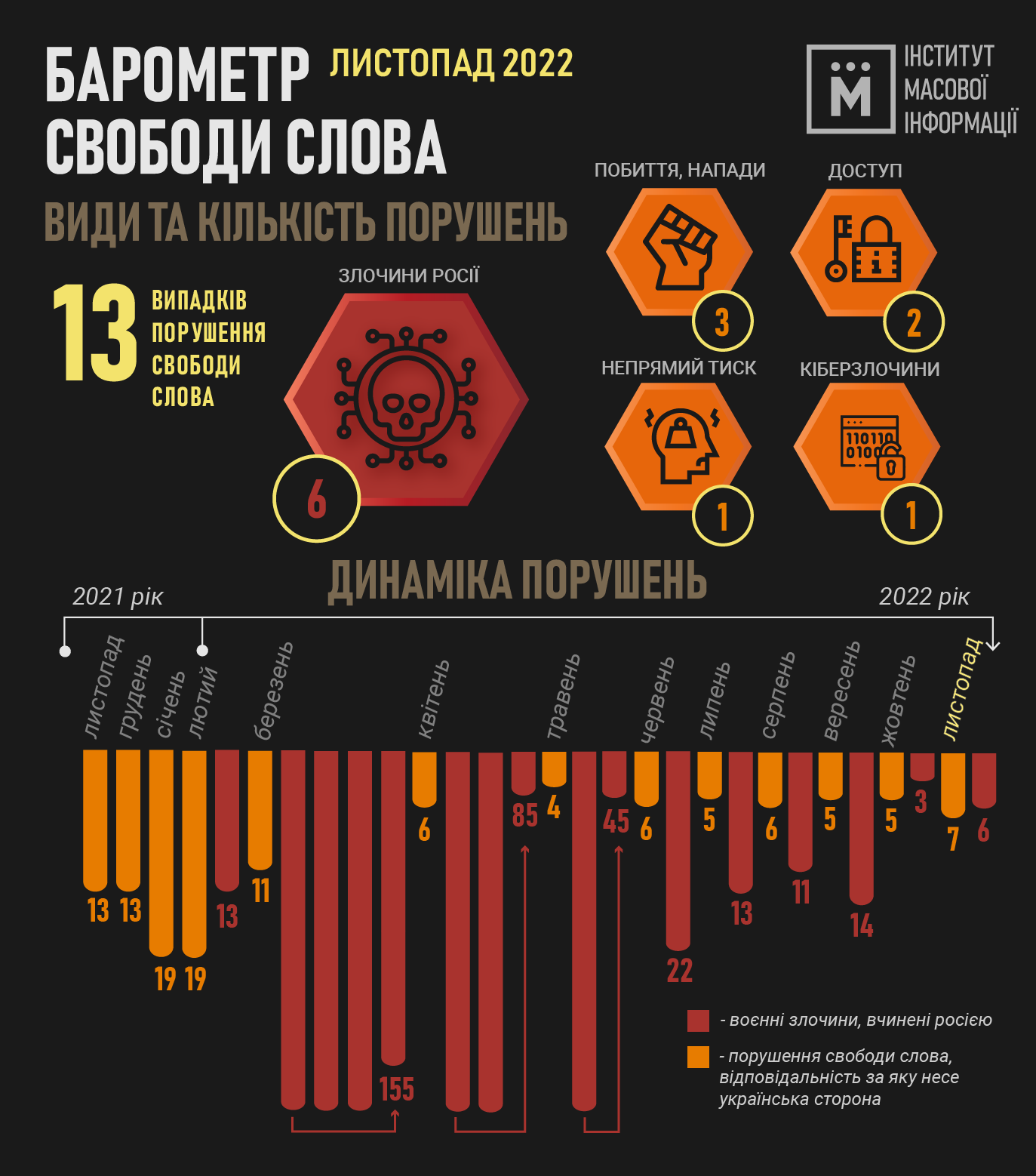In November, IMI experts recorded 13 crimes against freedom of speech in Ukraine. Six of them were committed by Russia against Ukrainian media and journalists.
The Russian crimes include kidnapping, destroying TV towers, cyber crimes, etc.
At the same time, IMI recorded seven cases of freedom of speech violation for which Ukrainian citizens are responsible. These are cases of beating and attacks on journalists, restricting journalists’ access to public information, cyber crimes, and indirect pressure.
These are the monitoring data by the Institute of Mass Information.

For instance, in November, Angela Slobodyan, journalist for the now closed TRC “Ukraina”, said that she had been kept in a Russian isolation prison in then occupied Kherson. She spent nearly a month in there, and it was only in November that she spoke out about the invaders abusing her and other captives, as well as torturing Ukrainian POWs. In her comment to IMI she specified that she believes the detention to be connected with her journalistic work.
Moreover, a day before their retreat from Kherson, on November 10, the Russian troops blew up the local TV tower’s transmission center, and then the TV tower itself.
In the meantime, in Poltava oblast, “Kozelshchynski Visti” newspaper closed down. Editor-in-chief Nadia Lytvyn said the reason for the closure was lack of funding. According to her, the publication’s main source of income was advertising, but now the demand is gone because of the war.
In addition, in November, two Ukrainian media outlets reported Russian DDoS attacks on their websites – NikVesti and Detector Media. A day before the attacks, Russian Telegram channels posted calls for “downing” the websites.
The freedom of speech situation in Ukraine for which Ukrainian citizens are responsible
In November, IMI recorded seven cases of freedom of speech violation for which the Ukrainian side is responsible. These include cases of beating and attacks on journalists, restricting journalists’ access to public information, cyber crimes and indirect pressure. Such cases were recorded in Kyiv, Zaporizhzhia, Dnipropetrovsk oblast, Rivne oblast, and Poltava oblast.
IMI recorded Priamy Kanal and Stopcor journalists being beaten and attacked in Zhovti Vody, Dnipropetrovsk oblast, while filming the rallying tobacco factory workers who had set up tents in the factory’s courtyard and were standing guard on its premises day and night. In Kyiv, an unknown man attacked journalist Yulia Zabelina near her home. This is the second attack she’s suffered in the last two months. In a comment to IMI she said that she believes the incident has to do with her journalistic work. Yet, she does not rule out the possibility that “some crazy reader” was stalking her.
Local authorities in Sarny city, Rivne oblast, and in Zaporizhzhia have been restricting journalists’ access to public information. The editors of five Zaporizhzhia media outlets asked the Zaporizhzhia City Council to resume online livestreams of City Council sessions. The reason for this appeal was the draft Regulation on remote meetings of the City Council, its executive committee and deputy commissions. The Sarny City Council failed to provide Chetverta Vlada with information about the salaries of the Sarny City Council’s top officials, despite the media having sent two requests. Only after Chetverta Vlada filed a complaint to the Commissioner and made the information on the obstruction of journalistic activities public did the state body respond to the journalists’ request.
Moreover, IMI recorded one case of indirect pressure on journalists by the President’s Office, whose head, instead of replying to a request from Bihus.info regarding staff appointments at Ukrnafta, made it public. Bihus.Info editor and journalist, Alisa Yurchenko, considers such a response an attempt not only to avoid answering, but also to discredit the journalistic profession.
Learn more here.
